ON THE TOWN with CHIP DEFFAA, August 26th 2019
I'm stunned and saddened by the passing of one of the best music directors I've known--and one of the nicest gentlemen-- Hubert Tex Arnold. He died suddenly, unexpectedly of a brain aneurism. He was getting ready to play a cabaret show for Sally Maye. I liked Tex very much, both personally and professionally. He was not just an exceptionally talented pianist and arranger, he was a very giving person. He was the music director for my show "The Johnny Mercer Jamboree," and the subsequent cast album. (And that is one of my favorite albums.) His inventive jazzy arrangements, filled with surprises, gave the show--and the album--a unique identity. (And he was foremost expert on Johnny Mercer's music.
[avatar user=”Chip Deffaa” size=”thumbnail” align=”left”]Chip Deffaa, Editor-at-Large[/avatar]
For my column this week, I want to tell you about some theatrical productions and performances I witnessed this year that–for whatever reason–really lodged themselves I my memory. I’ll just briefly mention a few standouts first, and then discuss them (and others) at greater length.
The most memorable single performance I witnessed anywhere this year? That’s the ever-amazing Betty Buckley, starring in the national touring production of “Hello, Dolly!”
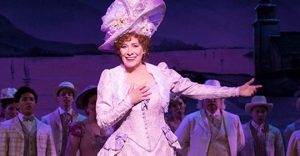 The funniest new musical I’ve seen in years (with a breakout Broadway starring performance, to boot)? That’s “Tootsie,” starring Santino Fontana.
The funniest new musical I’ve seen in years (with a breakout Broadway starring performance, to boot)? That’s “Tootsie,” starring Santino Fontana.
The new shows I caught in regional tryouts that I’d most like to see eventually come into New York City? One is “Because of Winn Dixie” (which strikes me as being near-perfect “as is”) and the other is “Benny and Joon” (which could use a bit more work but already offers significant rewards).
Revivals I saw this year that especially impressed me? “The Music Man” at Goodspeed and “My Fair Lady” at Lincoln Center.
And I’ll mention some other memorable productions a bit later. But now, let me tell you in more detail about some of the stars and shows that really had an impact on me.
* * *
Real greatness, in any art form is rare And Betty Buckley is one of the great musical-theater artists of our time She proved it anew in “Hello, Dolly!,” giving a performance I’ll never forget. For me, this was the most fulfilling theatrical performance I saw all year. (Buckley has been touring the nation for a year. I caught her at the Kennedy Center in Washington. I’m very glad I was able to see her.)
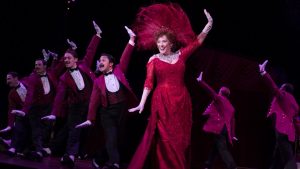
I wish every aspiring performer could see the way Betty Buckley makes the role her own, and the way she gets so completely inside the character that we can really share in the character’s feelings. And the show becomes more than just a succession of diverting musical numbers and book scenes; we’re witnessing Dolly’s emotional transformation–from a woman who’s withdrawn from the world to a woman who very much wants to rejoin it before the parade passes her by. Buckley wants us to see Dolly’s growth.
And by the time–near the end of the first act–that Buckley gets around to singing “Before the Parade Passes By,” the song carries great resonance. It’s very powerful, because we’re watching Dolly’s transformation. And Buckley performs with total commitment and conviction. (That has always been one of her distinguishing qualities as an artist.) Buckley’s performance hit me hard; it packed a great wallop. I felt like I’d seen a great drama.
Every performer has different individual strengths, and wisely plays to his or her own strengths. The character of “Dolly Gallagher Levi” gives a performer opportunities for moments of comedy, moments of pathos, moments of good old-fashioned show business razzle-dazzle, and more.
No one in musical theater today has better acting chops than Betty Buckley. And no one is a better singer. Buckley uses those particular gifts to give us an extremely well-acted and well-sung performance. She uses her particular strengths to give us a brilliant performance.
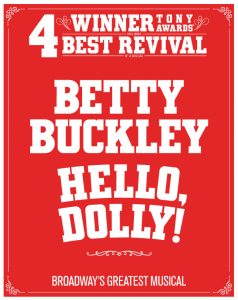
She is not a great natural clown. (And the greatest of clowns, needless to say, are not necessarily the greatest of actors or greatest of singers. Each performer has different strengths.) She is not a madcap comic–that’s not her forte–and yet, somehow, that turns out to be OK. She gets her share of laughs. (No one feels cheated in that regard.) But she is placing a somewhat different emphasis than others have in her portrayal of “Dolly.”
She makes us feel for Dolly as a person–a person whose life (despite all of the kidding around she does) has not been all that easy since her husband died, a woman who’s aware that time is limited, a woman who wants one more shot at life before it is too late. Buckley puts all of her formidable powers as an actor and as a singer to good use in this production. The key monologues (by Thornton Wilder) hit home. The awareness of mortality adds depth. I found her performance very powerful. And, in her own way and on her own terms, Buckley is tremendously moving. It is not the usual take on “Dolly.” But it works.
When she sang “Before the Parade Passes By”–and I’ll never hear it sung more effectively–I did not want it to end. I did not want to hear the ensemble. I was focused on her, what she was realizing. It came from a deep place.
And the show’s biggest number, “Hello, Dolly!”–one of the all-time greatest production numbers in theatrical history–paid off extra well. Because it was not just wonderful showbiz razzle-dazzle and fun to the nth degree; Buckley had given us the emotional set-up for it as well as anyone could. So we celebrated for her and with her, wholeheartedly, as she rejoined the human race.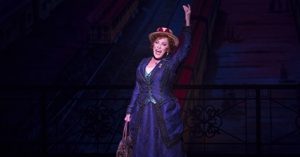
Buckley is also, quite simply, a star. And she was giving her all, every moment on that stage. It was very powerful theater–a first-rate performance–and I’m glad I witnessed it.
I’ve seen “Hello, Dolly!” many times, in many different places, with many different performers. It’s one of the greatest shows in the musical-theater canon. The best performers I’ve seen in the role made it uniquely their own, playing to their own individual strengths. If you’re a master comic, for example, you play up the comedy.
No one ever got more laughs in the role than the extraordinary Carol Channing, who originated–and long defined–the role. And Channing’s sheer charisma–her force of personality–was something to experience. She was having great fun in the role, she brought a vaudevillian flair to the role, and we shared in that. A wonderful performance, fully realized in its way.
Others found different aspects of the character to emphasize.
No one else ever got the spiritual quality that Pearl Bailey–who was also tremendous, but in an entirely different way from Channing–brought to the part. I watched, transfixed, as Bailey spoke to her dead husband; she raised her arm, her hand fluttering in the spotlight with the delicacy of a butterfly–and I half-expected the ghost of her late husband to materialize. (Channing and Bailey were two of the best artists I’ve ever seen, playing the role to perfection in completely different ways.)
“Dolly Gallagher Levi” is a demanding role. And not everyone is up to the challenges. Poor Phyllis Diller was a terrible “Dolly” on every leve; she could not act the role; she could not sing pleasingly; the comedy wasn’t her type of comedy; and–crucially–she had less presence than the supporting players surrounding her on the stage. So there was a void in the center of the production. And she was outshone by supporting players (like Danny Lockin, a perfect “Barnaby Tucker”). Diller’s great gift as a performer was always in delivering gags–perfectly timed one-liners. (She told rapid-fire gags with great success in nightclubs and on TV.) However, she could not display her particular gift within the confines of “Hello, Dolly!” It was not that kind of a show. (She tried to make up for some of her shortcomings as a performer in “Hello, Dolly!” by delivering assorted gags–a sampling of her nightclub act–after coming on stage to take a bow, at the end. That was when she finally came to life–performing a bit of her nightclub act, as part of the curtain call.)
Barbra Streisand, of course, was (and is) a first-rate singer, and she can sing anything well. But in the film of “Hello, Dolly!,” young Barbra Streisand could not make us really believe that she’d long mourned her late husband and needed to rejoin the human race. She sang, she got laughs, but the basic story of Dolly Gallagher Levi seemed to get lost in the process. We could enjoy her singing. But we did not feel for her. She was too young and too glib; it was a superficial performance. She was not able to properly inhabit that role (the way she had done so magnificently when she played “Fanny Brice” in “Funny Girl”).
Buckley, working on her own terms, is a terrifically memorable “Dolly.” She’s an artist to contend with. I’ve long felt that way about her. I liked her portrayal of “Momma Rose” in “Gypsy”–which she performed years ago at Paper Mill Playhouse–even more than the portrayals of that character by Bernadette Peters and Patti LuPone (which is saying plenty, because they are two of the giants of modern musical theater). She was the most compelling “Momma Rose” I ever saw. I loved her work in “Sunset Boulevard”–another role perfectly suited for her.
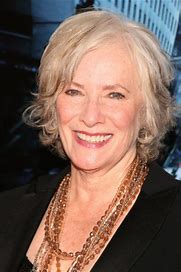
And her performance in “Hello, Dolly!”–as fresh and vivid as one could hope for–really reached me. Her performance, in its own way, is at least as effective as the performances I witnessed by Bette Midler and Bernadette Peters. And I like them both very much. But Buckley, who I liked more than either Midler or Peters in the role, touched me more deeply. And she seemed to be giving more completely. She was utterly in the moment. (I generally love Bette Midler, but at the performance I saw, Midler sometimes seemed to be walking through the role of “Dolly.” She was not giving 100%. So I was disappointed.)
Buckley has worked hard on this tour. She has lost 26 pounds, touring for a year in “Hello, Dolly!” And she will no doubt welcome a rest when it’s over. The tour will continue, with Carolee Carmello–whose work I’ve always appreciated–taking over the role. Buckley gives her final performance as “Dolly,” on Sunday, August 25th at the venerable Boston Opera House.
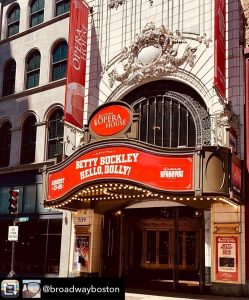
I’d hoped I’d be able to drive up to catch her final performance. Health issues prevent me from making that trip. But no matter. Buckley’s performance, which I caught in Washington, DC, is permanently lodge in my memory.
But it was a thrill to see Buckley in this role. And to see her sing out, fully, in that richly theatrical way of hers. Which she can do in a huge theater but can’t quite do–not in the same way or to the same effect–in the intimacy of a club. She’s one of our very greatest musical-theater artists. I hope theatrical producers will be wise enough to make more use of her on Broadway.
Producers ought to be working hard to keep her in front of the public. Real greatness, in any art form, is rare. And in “Hello, Dolly!” she gave the performance that touched me most deeply this year.
* * *
I caught the new Broadway musical “Tootsie” just before its official opening night. And, boy! It was years since I saw a musical that made me laugh so hard. I hadn’t laughed like that since“The Producers” opened, 18 years before. I left the theater delighted. If you’re looking for a new show with plenty of laughs, you can’t do better than “Tootsie.”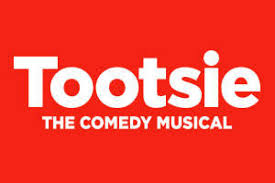
Of course, Santino Fontana is terrific–and eminently likable throughout–playing the down-on-his-luck actor who dresses up as a woman to land a role, and finds his life changed in the process. Of course he sings beautifully in his own voice–but he also has to speak and sing in a gal’s voice much of the time. And he carries that off with flair, too. Amazing job. (I’d hate to be the actor cast next in the role; Fontana will be a very tough act to follow.)
He’s been terrific in so many roles, large and small, over the years. I don’t think there’s a more talented leading man his age working in the theater today. I’ve watched him enhance so many good shows since he first came to New York. Whether he was performing Off-Broadway in “The Fantasticks” or on Broadway in “Hello, Dolly!,” he played the roles he inherited to perfection. It’s great to see him finally getting a big, breakout original Broadway role of his own. He won the Tony Award for his performance. And certainly deserved it. 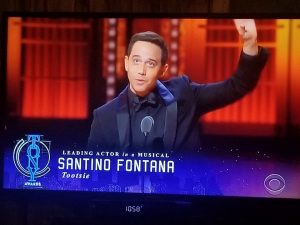
Fontana is a star; he deserves to have his name above the title. (I hope that will happen. I remember clearly, during the original Broadway run of “Cabaret,” when the producers finally realized what a talent they had in Joel Grey and they put his name above the title on the marquee, posters, and Playbill.) At present, he is billed below the title of the show and–curiously–in a font smaller than that of the show’s creators. He merits better billing.
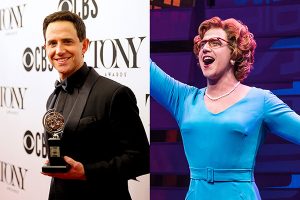
The book by Robert Horn–who also won a Tony Award this year for his work on “Tootsie”–is unusually strong; it’s not just a rehash of the original film script; Horn has introduced some unexpected plot turns and twists that really help.
And there are first-rate supporting performances by Lilli Cooper, Michael McGrath, Andy Grotelueschen, and the masterly Julie Halston (none better at comic timing–she had me laughing so hard, the way she zinged one line, I could not hear her next line because I was still laughing). It’s rare to find a show with so many well-written and well-performed supporting roles.
The songs, on first hearing, seemed stronger lyrically than musically. The overture was peppy, but I kept waiting in vain for a melody that would sweep me away. (The overtures of “My Fair Lady,” “Funny Girl,” and “Gypsy,” by contrast, are rich with melody.) The score includes some very funny songs, some great character songs. . But I kept waiting for one glorious ballad that would showcase Fontana to his best advantage. He is a splendid ballad singer–as he’s shown in musicals from “The Fantasticks” to “Hello, Dolly!”–but one would never know it just from “Tootsie.”
But the whole show is great fun. And I hope it does very well, and draws big crowds for many years to come. It is a big bright musical that anyone can enjoy.
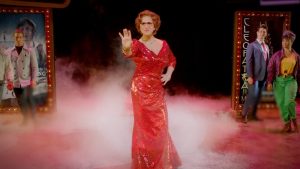
But predicting any show’s long-term commercial success is not always easy. The original 1982 movie “Tootsie” was exactly right for that particular time. This new stage adaptation is, for the most part, very well crafted. And it is chock full of excellent performances. And filled with laughs. I’d recommend it to anyone. But in some hard-to-define way, it’s not quite as “in synch” with the present mood as the original film was, 37 years ago. And that may have an affect on how long it runs. We’ll see.
* * *
The happiest surprise for me of this year was “Because of Winn Dixie,” a new musical currently getting a tryout at Goodspeed Opera House in East Haddam, Connecticut. I drove up with no expectations. Oftentimes, I hear some sort of buzz about shows before they open, simply because the theater community is small and I usually know–at least slightly–people working on shows. And people will talk. And I’ll hear that everyone seems to feel really good about this show, or many are wondering if the problems with that show can ever be fixed. But in this case, I heard nothing at all. And I was utterly charmed by the show.

“Because of Winn Dixie” — a sweet, simple, beguiling show — is the most rewarding original musical I’ve seen at Goodspeed Opera House in decades. The book and lyrics are by Nell Benjamin, who’s perhaps best known for “Legally Blonde” (which I always thought was a fun show but lightweight) and the music is by Duncan Sheik (best known for “Spring Awakening,” which I found intriguing but uneven). I think “Because of Winn Dixie” is their best work to date. Directed by John Rando (“Urinetown”), it is sentimental without getting cloying. It has moments of unexpected honesty and magic. And there isn’t a weak element in the production. It is impeccably cast.

I hope a way can be found to bring it into New York, to play at either a large Off-Broadway house or possibly a small Broadway house. (I would not recommend puffing up the production–adding superfluous ensemble members and such–to make it seem “bigger” for one of Broadway’s bigger houses; it has an attractively delicate, evanescent feel that could easily be lost.)
There is much that I like about this show (based on the well-known film and novel of the same name). Let me tell you about some of the things I like.
At the heart of the show, there is a girl who feels lost and lonely. Her mother has walked away from the family. Her father, a Southern Baptist preacher, is trying to start over, making a new life for them in a new town in Florida. Her only friend is stray dog, whom she named “Winn Dixie,” who wanders into her life just by chance.
So, the two main characters are a girl who’s about 13 and a dog. It’s certainly not easy to find a 13-year-old actress and a dog that can carry a musical–but they’ve done it.

Because of Winn Dixie, Goodspeed Musicals
Josie Todd, playing the girl, “Opal,” is a real find. She gives a first-rate performance–earnest, natural, unspoiled. (The last time I was this impressed by a child actress on stage was when I saw Sydney Lucas in “Fun Home” on Broadway, about four years ago.) You’ll never catch her “acting.” She is utterly believable from start to finish. She has a waif-like appearance, and conveys a mix of vulnerability and resilience that is exactly right for this character. (One reason I hope the show comes to New York before too long is that it is very difficult to find just the right child actress for this kind of role. And kids can change quickly as they grow up. In a couple of years, Josie Todd might be right for other roles but won’t have the piquant vulnerability needed for this one.)
Her co-star, Bowdie, playing the dog, is equally perfect for his role. This is certainly the best work by a dog I’ve ever seen on stage. The dog is on stage constantly–and in one key scene, is the only actor we see on the stage! Bowdie is trained/directed by the great Bill Berloni, who has provided the dogs for more than two dozen shows in New York, as well as assorted film and TV projects. And this show is Berloni’s triumph!
I’ve followed Berloni’s career since the very beginning. We were both very young when I first interviewed Berloni and his first dog, Sandy, at their home in Glen Rock, NJ, where I also lived, when the musical “Annie” opened on Broadway. That musical–which premiered at Goodspeed before transferring to Broadway–made Berloni famous as a dog trainer: William Berloni Theatrical Animals, Inc. (And he’d never before been a professional dog trainer.) Bill Berloni and his wife, producer Dorothy Berloni, were actually the driving force behind this production; they wanted to do the first musical in which a dog would play a starring role, rather than be a peripheral character. And they put together the creative team to write “Because of Winn Dixie. “ Berloni’s dog Bowdie–whether running on stage in a storm, providing comfort to a child who’s hurting, or simply walking down the aisle of the theater–is a scene-stealer.

But the whole show is well-cast. I don’t know where they found such talented kids. Jamie Mann is spot-on perfect–funny and goofy, and likable all at once, as “Dunlap.” Just great! Sophia Massa is cute-as-pie (and annoying when need be) as “Sweetie Pie,” and Chloe Cheers and Jay Hendrix play their roles well. And I could understand every word spoken (or sung) by every kid in the cast. That alone is noteworthy. So often when I’ll see shows with kids in the cast–whether a regional production or a Broadway production–there will be some kids on stage swallowing some words. They haven’t learned the basics–that the first thing an actor must learn is to speak clearly enough so your words are understood. But I never missed a word (or a bark) from any actor in this production.
Broadway veteran Roz Ryan–who has enriched every show I’ve seen her in (“Chicago,”
“Dreamgirls,” “Ain’t Misbehavin’,” “ The Pajama Game,” “One Mo’ Time”)–has never been better. And she’s the real thing!
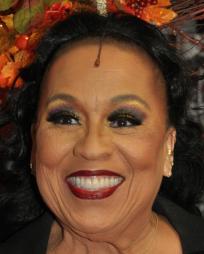
Roz Ryan
She projects tremendous power, wisdom, and authority on “Bottle Tree Blues” (which sounds as if it was tailored for her particular strengths). I’d see the show again just to see her do that number. (I’ve always loved her singing and she gets better and better with age.) She does not have a lot of stage time, but she is unforgettable. And serves the show well. If this show transfers to New York, as I hope it will–she is essential.
Robert Spencer is effective and believable as the troubled Preacher, struggling to raise a daughter by himself. It’s a very nice performance, and a very human one. (Writer Nell Benjamin does an admirable job of letting us see each character’s humanity; that’s where she’s grown as a writer since the start of her career. The book scenes are well-written, and there’s a very good balance between the book scenes and the songs.) David Poe is credible as the singing pet-shop owner. Isabel Keating, whom I liked very much, makes every moment count as the librarian. (And she gets one of the best scenes in the show.) But every member of the ensemble gets to make a contribution.
There is one area where, I think, some very minor tweaking could improve the show. The characters played by Ryan and Poe are initially rumored to be dangerous, but then quickly–too quickly, I believe–they turn out to be good people who’ve been misunderstood. Things proceed in a way that is a little too quick and a little too pat for the revelations that they’re good people to really pay off. If a bit more time could be taken to build tension–if we’re given more reason to wonder if they’re actually as dangerous/crazy/weird as everyone says before the tension is broken–the resulting emotional relief would be stronger. Make us worry a bit about these characters before letting us see their hearts of gold!
And there’s one other very minor change I’d recommend. Brian Michael Hoffman, who does a fine acting job playing one of the parents, “Jiggs,” is credited in the program as being both an actor (playing “Jiggs”) and also being an onstage dog handler for Bowdie. I’d let the “dog handler” credit stay in his production contract and on his personal resume, but I’d omit it from the Playbill which is read by the public. I read the Playbill before the show and when I learned that he was an on-stage dog handler, not just an actor, I started watching for how he was cueing the dog (which we’re not supposed to even notice). I couldn’t help but watch for it, once the program had called attention to the fact that he was a dog handler, not just an actor. Personally, I’d rather we not know who’s helping to handle the dog on stage; it will better preserve the illusion that what is happening on stage is real. If I go to see a stage show by a master magician and he’s got paid “plants” in the audience working for him, I don’t want to be informed that those individuals are assisting him. I wouldn’t want them credited as such in a program; I’d rather have the illusion. It’s fun to be fooled.
And for me, it’s a similar thing here. I don’t want to know that an actor also has a second job, handling the dog. That’s a very minor point. But for me, it pulled some focus from the dog, Bowdie, as I watched to see what Hoffman was doing to handle the dog.
“Because of Winn Dixie”plays at the Goodspeed Opera House through September 5th. I hope it transfers to New York as soon as might be practical. (And if that can’t happen quickly, I’d hope they can get other regional productions quickly, to help keep some of the cast intact.) It is a very good show–the best new show I’ve seen at Goodspeed in decades. It doe not need any major work. And it’s rare to encounter a new musical getting a regional tryout that doesn’t need significant work.
There is always a temptation to keep trying to revise and rework a show to make it better–but changes don’t always make a production better. (I’m remembering the musical “Summer of ’42,” which I first saw at Goodspeed nearly 20 years ago; the changes they made, when they transferred the production from Godspeed to New York weakened the show.) This show, I believe, is basically good-to-go. “Annie” got its start at Goodspeed, and went on to win the hearts of audiences in New York and elsewhere. I hope this good, new, open-hearted show will follow in “Annie’s” footsteps. I liked it a lot. I’m going back to see it again.
* * *
One other new musical I saw in a regional tryout this year that won me over was “Benny & Joon”– a gentle, winsome adaptation of the film of the stage name. It still needs a bit of work–there are times when it seems to lose forward momentum, seemed to be drifting a bit.
But the moments that fully work are lustrous. (The gal-pal I took with me liked it so much she went back to see it two more times!)
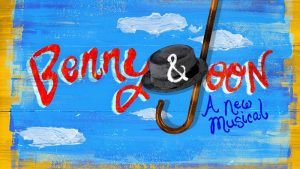
It’s unique–unlike anything else on the boards right now. Many musicals like to start with a big, bright, rousing production number. This musical has about the quietest, softest–and most completely intriguing–opening I’ve ever seen. I was won over in the very first scene.
And there’s a performer, Bryce Pinkham, giving one of the most appealing performances I’ve seen anyone give anywhere in recent years. He’s not top-billed; he doesn’t get to take the last bow. But he’s really magical, with an air of whimsy evocative of great silent-screen comics.
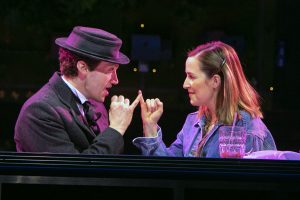
This musical (with book by Kirsten Guenther, music by Nolan Glasser, and first-rate lyrics by Mindi Lilah Dickstein) deals with a subject I would never have imagined suitable for a musical: a man caring for a mentally-ill sister. The creative team has given us a musical with great inventiveness and great heart. It’s a show that opens one’s soul. It’s fresh, unconventional. The three leads are all very good. And Bryce Pinkham is extraordinary.
I’ve always admired Mindi Dickstein’s work–going back to when I first saw her show “Black Beauty” some 20 years ago. (I actually saw “Black Beauty” twice, in New Jersey and New York.) She’s perhaps best known for “Little Women.” But this is a more imaginative, less conventional show. And I think it contains her most interesting and rewarding lyrics to date.

Mindi Dickstein
She can be at once poetic and realistic. She has crafted lyrics for a character who’s mentally ill that both (a.) have real beauty and (b.) sound like the character, are true to the character’s condition. My hat’s off to her. I love writing songs. But I would not have known how to do what she did. I would scarcely have believe it possible.
This is a tender, intimate musical, with plenty of rewards. I hope it comes into New York eventually, booked into a suitable Off-Broadway house. It is a quiet, touching kind of show. I’m glad Paper Mill Playhouse took a chance on it. But Paper Mill–which is a Broadway-size house–struck me as too large a playhouse for this very special show. Its charms can be more fully appreciated in a more intimate house.
* * *
Boy! Goodspeed Opera House has really been on a roll this year. They not only presented an excellent new show that I’d like to see come into New York, they also presented the most satisfying revival of a musical that I saw anywhere this year. I loved their presentation of “The Music Man” this Spring. I thought it was the most effective revival of a show I’ve seen at Goodspeed since their version of “Carousel” seven years ago. And with a cast of 28, it’s one of the biggest productions I’ve ever seen on the intimate Goodspeed Stage.
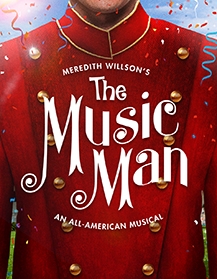
Director Jenn Thompson got the tone just right. This production was rich with feeling. And although I know “The Music Man” inside-out, I was moved to tears several times. (I don’t think anything on Broadway in the last few years has moved me to tears.) That’s a tribute to the chemistry between the key players, the writing, and the direction.
The story was beautifully told, and Thompson made terrific use of the space. Her actors were not just filling the stage, they were in the aisles, and moving about. The whole theater brimmed with life.
I want to acknowledge not just co-stars Edward Watt (Prof. Harold Hill) and Ellie Fishman (Marian), but supporting players who contributed so much: D.C. Anderson (Mayor Shinn), Stephanie Pope (Eulalie McKechnie Shinn), Juson Williams (Marcellus Washburn), Raynor Rubel (Tommy Djilas), Amelia White (Mrs. Paroo), and Alexander O’Brien (Winthrop)–also splendidly costumed by David Toser, who certainly understands early 20th century America. (Full disclosure–he also costumed my Off-Broadway show “George M. Cohan Tonight!,” set in the same era.) And I can’t leave out choreographer Patricia Wilcox.
I’ve seen “The Music Man” many times over the years. (One night I even had the privilege of watching the last Broadway revival from the wings.) And yet I still find new things in it. What a genius Meredith Willson (creator of the book, music, and lyrics) was. There is not an extraneous line in that script. It’s as perfectly constructed a musical as can be found. And rich with melody. (And counter-melodies, too, time and again.)
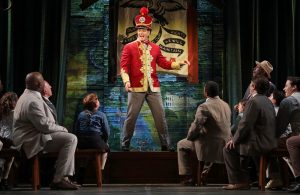
The storyline will be familiar, I suspect, to most readers here. Prof. Harold Hill is a con-man, trying to coax residents of River City, Iowa, into parting with their money so he can create a boys’ band. He actually knows nothing about music; he has no intention of doing anything except fleecing the rubes and then fleeing. But he finds, to his surprise, he actually falls in love with the town’s librarian and music teacher, Marian. And we watch, in wonder, as Marian falls in love with him (and as actress Ellie Fishman, playing Marian, opens up emotionally before our eyes).
And we see the transformative effect that the likable rogue Hill has on so many people–from the Mayor’s wife, wonderfully portrayed by Stephanie Pope (whom I’ve enjoyed in shows ranging from “Chicago” to “Thoroughly Modern Millie”) to the town’s bad-boy, Tommy Djilas (played with just the right spunk and sass–not to mention dancing skills–by a promising actor new to me, Raynor Rubel), to the withdrawn, troubled young Winthrop (and when Winthrop, played so convincingly by Alexander O’Brien, came out of his shell, the theater exploded with applause).
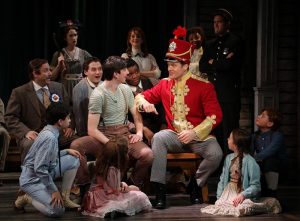
And by the time Marian tells Winthrop of the magic Harold Hill has created, we don’t doubt her for a moment–because we’ve all experienced it. This production really got to me. And director Jenn Thompson, I suspect, will in time be directing other productions of this show other places–because she gets it.
* * *
There was much I liked about Lincoln Center’s ambitious but flawed revival of “My Fair Lady” (directed by Bartlett Sher). The production values were first-rate. The sets and costumes were sumptuous. The production was often ravishingly beautiful–as befits this classic show. And I liked that they used a revolving stage (as did the original Broadway production, which I saw late in its run). The singing by the ensemble was rich and full and true–the best ensemble vocal work I’ve heard in years. “My Fair Lady” is a classic–as perfect a musical as anyone has ever created. (The musical, which opened on Broadway in 1956 and ran for seven years, was based on George Bernard Shaw’s 1913 play “Pygmalion,” and Gabriel Pascal’s 1938 film adaptation of the play, borrowing elements from both). And I’m always glad to see a revival.
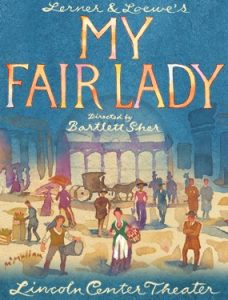
But I left feeling disappointed. The leads struck me as competent, but lacking star-power. (An understudy was covering the role of “Eliza” at the performance I caught.) “Higgins” lacked sufficient authority; he was a likeable lightweight. He must be more formidable for the full dramatic potential of the show to be realized. The show, at times, felt rather like an ensemble production. The strongest performance was actually given by Rosemary Harris (who is 91, and has always impressed me n stage), playing the mother of Henry Higgins. She had the most presence. She commanded the stage, in her brief scenes, in a way that the nominal co-stars of the production should have, but did not. “Stage presence” is hard to define; but she had certainly had it, and she compelled my attention.
I was also disappointed in the revised ending. “My Fair Lady,” as created by Alan Jay Lerner (book and lyrics) and Frederick Loewe. (music) , and as originally directed by Moss Hart, ended with Eliza Doolittle and Prof. Higgins remaining together, to presumably live happily ever after. That was a satisfying ending, and it felt natural, given all that had preceded it. (Lerner and Loewe chose to have an ending more like that of the 1938 film version of “Pygmalion” than of Shaw’s original play). In the Lincoln Center revival, Eliza–fed up with Higgins’ treatment of her–walks out on him. It did not feel natural to me. That ending felt grafted on. Had Lerner and Loewe wanted the musical to end like that, they would have made different choices to help set up that ending. But in the Lincoln Center revival, she abruptly walks out–while the orchestra plays the same “happy ending” music that’s always been played in that spot (and would not have been created for that spot had the intent been to have her walk out on him). The creative team gives a great deal of thought to how they want their work to end. I wish the intentions of Lerner & Loewe and Moss Hart had been respected. The revival left me with a slightly sour taste in my mouth. This wasn’t the way “My Fair Lady” was intended to end. And the ending–given all that had led up to it–felt awkward to me.
It’s good to see “My Fair Lady” revived.. But theater-goers too young to have witnessed the original Broadway production should have been given a chance to see the musical as originally conceived. One of my younger friends, who’d never before seen “My Fair Lady” in any form, loved the production, remarking to me that it felt “bigger” than any Broadway show he’d ever seen. (There is something grand about the show.) And he marveled that “there are more than 30 actors on that stage”–which impressed him, because he’s not used to seeing so large a cast on Broadway these days. But the original Broadway production actually had more than 50 actors on stage. I saw that production at the gorgeous Mark Hellinger Theater (now a church). I could show you the Playbill and the souvenir program. It’s a pity that a well-funded, not-for-profit institution like Lincoln Center could not have duplicated the original cast size. If only to fully remind us of what a big Broadway musical once looked like.
* * *
I’m very glad I got to go to the opening of “Lolita My Love” at the York Theater. This was the first time this musical has ever been seen in New York. Alan Jay Lerner (book and lyrics) and John Barry (music) created the show in 1971 but it died during an out-of-town tryout. It closed before ever reaching Broadway. The score is good; Lerner is–needless to say–one of the cleverest and most surprising of musical-theater lyricists. He’s one of the giants, and any work of his is worth checking out. And I delighted in his lyrics for this show.
John Barry’s music is fine. I wanted to love the show, if only because of Lerner’s stature . I’d love to see another Lerner show getting productions. His lyrics are excellent.
But the show I saw was a muddle–it started strong then went off the tracks in the second act. And the show I saw didn’t seem to be sure whose story it wished to be telling, whose point of view it wanted to present. And that’s a problem.
Most of the first act, in this revised version of “Lolita,” was very good–the tone surprisingly rhapsodic at times, with plenty of black humor mixed in. And the star, Robert Sella, performed with brio.
The second act was, alas, far less satisfying–it felt bumpy, disjointed. (The novel does a far better job of maintaining a unified feel from beginning to end.) The script felt labored–you could almost feel different hands working it to death, trying to find a way to successfully adapt Nabokov’s novel for the stage.
I’m glad the York has attempted to bring this show back, in revised form (adapted/edited by Erik Haagensen, drawing upon various drafts and notes by Lerner, and directed by Emily Maltby). This is the kind of valuable work that the York Theater Company, under the longtime leadership of Jim Morgan, does well. (The York is dedicated to musicals. No one else has tried to re-examine this show; and the York has proven here that it’s worth re-examining.) With further work, this show might possibly have a future life. There’s a lot here that’s satisfying–including some very good songs–and the basic story is almost always interesting. I’d love to see it get further development and a full production. But I’m not persuaded that the current adaptor/editor and the current director are the ones to rescue this musical. They’ve tried, and their version of the musical is, ultimately, a jumble.
The leads–Robert Sella and Caitlin Cohn–were perfectly cast, and fascinating. You couldn’t find a better Humbert or Lolita. (Caitlin Cohn, fresh out of NYU, nailed her part. This performance should get her work. And Sella projected well both the ardor & enthusiasm and the jealousy & possessiveness of Humbert.) George Abud, Jessica Tyler Wright, and Thursday Farrar performed with zest. And of course I was happy to see the versatile Analise Scarpaci, who always makes good impression (and has worked with me), in the cast. I was impressed with all of the actors, who created surprisingly finished performances with only 30 hours of rehearsal. (The leads created unforgettable performances, in very short time.)
“Lolita” is, of course, about a middle-aged man’s quest to woo and bed, and sustain a sexual relationship with an underage girl. This production can’t seem to decide if it wants to tell the story from the protagonist’s point of view (and have us, in effect, rooting for him as he pursues “Lolita”) or if it wants to tells us what a cad he is. It tries to do a little of both, and ultimately falls apart. The script, at times, seems to be fighting itself.
This adaptation adds a framing device–the protagonist in relating events to a psychotherapist, who seems to react (via facial expressions and words) with disapproval, outrage, shock. But the framing device feels like something of a cheat. The therapist is being used to convey disapproval of the protagonist. It’s as if the adaptor wants to use the therapist to remind us that the adaptor does not condone Humbert’s relationship with “Lolita.”
But a therapist is–or should be–a trained professional who listens in a non-judgmental manner, so as to encourage the patient to open up. This “therapist”–repeatedly making it clear she is shocked, dismayed, repulsed by what her client is saying–seems unprofessional. She seems more like a playwright’s device than a believable character. And the play gets sort of confusing. There are heavy-handed attempts to remind us that the protagonist’s desires and actions are wrong. (The lights go all red at one point, lest we fail to recognize what a devil he is.) It feels like the adaptor and/or the director wants us to know that–and be reminded again and again–that the protagonist is behaving very badly. And of course the actor playing the protagonist is wonderfully charming. The musical seems, at times, to be “with” the protagonist and, at other times, “against him.” The production invites us to vicariously participate in the protagonist’s pursuit of “Lolita,” while assuring us–in this age of the “Me, too” movement–that it doesn’t care for him at all. It tries to have it both ways. And none too artfully.
By night’s end, it all feels rather confused. Which isn’t the case when you read Nabokov’s novel.
I’d like to see someone find a way to make this show work. The story is interesting. The actors co-starring at the York were brilliantly well-cast. There are some good songs. And some first-rate Lerner lyrics. They deserve to be heard. But the presentation at the York Theater–despite a mostly very effective first act–ultimately failed. Someone, someday, may find a way to make this show fly. It hasn’t happened yet.
* * *
The most memorable college production I saw this year was the musical “God Bless You, Mr. Rosewater” at Princeton University. It was so well done– directed with verve by one Kirsten Traudt–I wanted to go back and see it again. I don’t judge college productions the same way I judge professional productions. But this was really a delight. They caught the gentle whimsy of that unusual musical wonderfully. And that’s hard to do; many directors and actors will make the mistake of trying to underline the jokes, or over-exaggerate the humor. What made the stars’ performances so satisfying was that they played their characters with just the right touch, with a certain sincerity. A twinkle in the eye, but not over-doing it. They let us come to them and discover the humor for ourselves.
Mark Dodici — new to me — played the lead about as perfectly as it could be played. He captured Eliot Rosewater’s kindness, naivete, guilelessness, and self-doubts. And sang sweetly, vulnerably. He gave one of the most satisfying performances I’ve ever seen at Princeton.(Which is saying plenty. And I’ve been seeing productions at Princeton since I think the Year Two, or thereabouts.)

Emily Cruz likewise got inside of her character completely, believably; a pleasure to watch. And Violet Gautreau–what a pistol she is on stage; I love her energy and comic timing–made every moment count, playing multiple roles. I watched her and I was thinking, “Where was she when I was casting my Off-Broadway show “One Night with Fanny Brice”? She has the moxie and brass and presence to carry it off. (I talked to her for a minute after the show–she was in high school in Chappaqua, doing a production of Seth Rudetsky’s musical, “Disaster.”) And I liked Grace Huegel’s drive. If I mention everyone, we’ll be here all day. But I had a great time. And the students made good use of a simple by effective set (designed by William Alvarado) that wisely gave them two levels to work on, so one scene could be played against another…. There were some minor missteps, of the sort always found in college productions. (If you’re moving furniture onstage, make sure the wheels are well-oiled, or sliders are in place, to minimize distracting noises; and try not to move anything when someone else is singing; the pianist can vamp till ready.)
Oddly, the program did not credit the creators of the work at all. It should say something like: “book and lyrics by Howard Ashman, music by Alan Menken, and additional lyrics by Dennis Green; based on the novel by Kurt Vonnegut.” I don’t fault the students for not knowing that the creators of the work must always be credited. (It’s a contractual obligation when you license a play, and it’s also an ethical obligation–just like crediting sources when you write a junior paper or a senior thesis.) Students don’t always know these sorts of things, but some faculty adviser or dean should be teaching them. (And as a playwright, I’m extra sensitive to that issue.) I gave one regional theater company holy hell when they ran one of my plays–for a very long run–without crediting me. They were paying me very well. But the creators of a work always need to be credited…. That said, I had a very good time. I like the Princeton University Players I was glad to see some memorable performances. And the sheer beauty of Princeton always gets to me. I love visiting. (I actually lived in Princeton for several years after graduating from the University. Not a bad place to live.)
* * *
I’m glad I got to see “Spring Awakening,” directed by Magnus Tonning Riise, with spirited contemporary choreography by Bethany Dellapolla (which the cast clearly enjoyed executing), and music direction by John Bowen. . This was a youth-theater production of a very challenging show, and the teens of NexGen Youth Theatre rose to the challenge. Of course Jackson Demott Hill (from such shows as “Finding Neverland” on Broadway and “Singing Beach” Off-Broadway), playing the key role of Moritz, acted well; I’ve always enjoyed his work a great deal; he’s a fine actor and the role gave him a good opportunity to stretch.
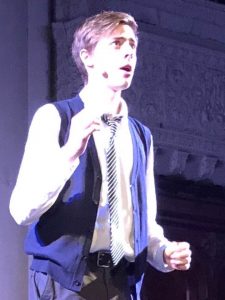
But many others–mostly new to me–also came through very well. Hero Cordileone was a joy to watch–simple, direct, honest work. Ryan Weintraub (whom I’d seen in “Zombie Prom”) and Matthew Duer were perfect in their well-received scene together. Skivon Hardy, Annelise Laaako, Angel Rafael Hernandez, Lea Hawthorne, all provided the different elements the show needed to succeed, This theater company is a welcome addition to the region. The one significant flaw was that it was impossible to hear all of the lines. There was a problem with the venue’s acoustics, and the sound design/miking. I’m highly familiar with the show, so I could follow it OK–and the sound quality was somewhat better in the second act. But my guest, who had not seen “Spring Awakening” before, could not catch key lines. And others I spoke with at intermission shared that concern. (There were no problems with the theater company’s last production, held at another venue.) Something to think about for future productions, because you want to grab every audience member completely from the first words. But I loved the energy on that stage. This new theater company–in its first year–is off to a good start. And any young people looking for a good place to develop their skills in theater (or parents of such young people) ought to look into
NexGen Youth Theatre.
 I’m somewhat ambivalent about the musical “Spring Awakening.” Some of the songs grab me; others I just sort of patiently endure. But young people seem to love the show–they love seeing it and they love performing it. And the energy level was wonderfully high in this NexGen Youth Theatre production. I liked that enthusiasm. And am glad NexGen is giving youths interested in theater a place to learn and have fun.
I’m somewhat ambivalent about the musical “Spring Awakening.” Some of the songs grab me; others I just sort of patiently endure. But young people seem to love the show–they love seeing it and they love performing it. And the energy level was wonderfully high in this NexGen Youth Theatre production. I liked that enthusiasm. And am glad NexGen is giving youths interested in theater a place to learn and have fun.
* * *
I’d like to call some attention to a promising new playwright. Let’s call this category “the best playwriting debut I witnessed this year.” I enjoyed “Of the Sea” by a new playwright named
Fiona Gorry-Hines, which I caught at the Access Theater. Oh, it’s certainly not perfect. It rambles and it overstays its welcome just a bit. It would benefit from some judicious pruning; the ending needs to come a bit sooner. But I was impressed by the playwright’s originality, gift for s
story-telling, and feel for dialogue–particularly the dialogue of young people. The remarks of the teenage characters really rang true to life. I felt almost as if were evesdropping on real teens. The playwright may be a bit sprawling in her writing, but she’s the real deal. There’s life in her script. And I hope to see more of her work. I enjoyed the cast (including Alexa Shae Niziak,
Lynn Guerra, Zoe Wilson, Erich Schuett, Sean Quigley, Paul Boocock). Director
Alex Cadena made good use of open space. The Irish accents were not as consistent as they could have been, and occasional lines were unclear due to actors garbling their words. (The first responsibility of a director is to make sure the words are all clearly heard–especially important if you’re working with younger actors.) But, flaws aside, this Equity Showcase production lodged itself in my memory. Good new playwrights are rare. And I look forward to watching
Fiona Gorry-Hines’ growth.
There are many more plays and artists I could comment on. But the ones I’ve mentioned here today, for one reason or another, all got to me a bit more than most that I see. And I’m grateful I got to see these shows.
* * *
I’m stunned and saddened by the passing of one of the best music directors I’ve known–and one of the nicest gentlemen– Hubert Tex Arnold. He died suddenly, unexpectedly of a brain aneurism. He was getting ready to play a cabaret show for Sally Maye. I liked Tex very much, both personally and professionally. He was not just an exceptionally talented pianist and arranger, he was a very giving person.

Hubert Tex Arnold
He was the music director for my show “The Johnny Mercer Jamboree,” and the subsequent cast album. (And that is one of my favorite albums.) His inventive jazzy arrangements, filled with surprises, gave the show–and the album–a unique identity. (And he was foremost expert on Johnny Mercer’s music.I only wanted to do that show if he were available.) He was perhaps best known in the business for his 25-year-long association with the legendary singer Margaret Whiting (seen with him in the last photo below). He arranged and conducted her performances in clubs and concert halls, on radio and TV and on records, and with major symphony orchestras. He wrote arrangements and orchestrations for the Lincoln Center American Songbook series and for Carnegie Hall tributes to the song-writing teams of Alan and Marilyn Bergman, and Betty Comden and Adolph Green. As a pianist, he accompanied Broadway stars Melissa Errico at the Cafe Carlyle in NYC, and Barbara Cook in concerts throughout the country, including performances at the LA Music Center and Carnegie Hall. He worked with artists ranging from Tiny Tim to Julie Wilson.
He was an instructor for the annual Cabaret Symposium at the Eugene O’Neill Theater Center for many years, and its successor program, the Cabaret Conference at Yale University. I admired Tex as a musician long before I knew him personally. I loved his playing so much that, I eventually told him I hoped we could work together someday. He was essential to the success of “The Johnny Mercer Jamboree,” and helped suggest performers and songs to include. (And crafted some challenging arrangements that were a joy to listen to.) He was easygoing in day-to-day life–and a stickler for perfection when rehearsing a show or helping to produce an album. He will be missed.
– CHIP DEFFAA, August 24th, 2019
.

Leave a comment